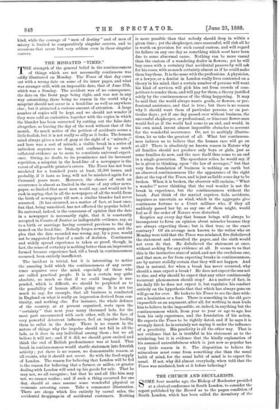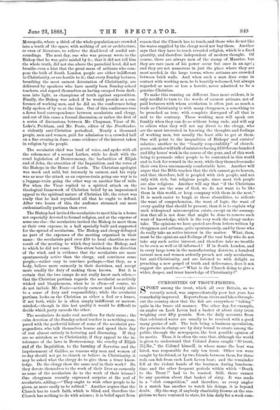THE CHURCH AND SECULARISTS.
SOME four months ago, the Bishop of Rochester presided at a clerical conference in South London, to consider the report published by the Record as to the pagan condition of South London, which has been called the dormitory of the
Metropolis, where a third of the whole population are crowded into a tenth of the space, with nothing of art or architecture, or even of literature, to relieve the dead-level of sordid sur- roundings. The next day, one who was present wrote to the Bishop that he was quite misled by it ; that it did not tell him the whole truth, did not rise above the parochial level, did not breathe even a hint that the great mass of artisans who com- pose the bulk of South London people are either indifferent to Christianity, or are hostile to it ; that every Sunday lectures, breathing the most earnest detestation of Christianity, are -delivered by speakers who have mostly been Sunday-school -teachers, and regard themselves as having escaped from dark- ness into light, as champions of truth against superstition. Finally, the Bishop was asked if he would preside at a con- ference of working men, and he did so, the conference being fully spoken of by us at the time. Out of this conference rose a fierce local correspondence between secularists and clergy, and out of this came a formal discussion, or rather the first of lt series of discussions, between Mr. Chapman, Vicar of St. Luke's, Peckham, and Mr. Foote, editor of the Freethinker, a violently anti-Christian periodical. Nearly a thousand _people, men and women, paid for admission to a crowded hall on a fine evening in June : some evidence of the interest taken
• in religion by the people.
The secularist chief was loud of voice, and spoke with all the vehemence of a second Luther, while he dealt with the -cruel legislation of Deuteronomy, the barbarities of Elijah and of Jelm, the atrocities of the Inquisition, and the votes of the Bishops in the House of Lords. The Christian apologist was meek and mild, but intensely in earnest, and his reply -was as near the attack as an express-train going one way is to a luggage-train going the other way on another line of rails. For when the Vicar replied to a spirited attack on the theological framework of Christian belief by an impassioned appeal to the spiritual nature of Christian life, the retort was ready that he had repudiated all that he ought to defend. After two hours of this, the audience streamed out more -enthusiastically partisan than ever.
The Bishop had invited the secularists to meet him in a house not especially devoted to formal religion, and at the expense of some one else : the secularists invited the Bishop to meet them at their own expense, in a hall specially built and supported for the spread of secularism. The Bishop and clergy defrayed no part of the expenses of the meeting organised in their name : the secularists paid over 210 to local charities as one result of the meeting to which they invited the Bishop, and to which he did not come. This straw betokens the direction of the wind, and is evidence that the secularists are more -spontaneously active than the clergy, and convinces some people,—rather easy to convince perhaps,—that they, as a body, believe more earnestly in their doctrines, and accept more readily the duty of making them known. But it is certain that the two camps do not really know each other,— that the Christian partisan regards the secularist as actively wicked and blasphemous, when he is often—of course, we do not include Mr. Foote—actively earnest and keenly alive to a sense of duty and responsibility ; while the secularist partisan looks on the Christian as either a fool or a knave, if not both, while he is often simply indifferent or narrow- minded,—though in this last quality it would be difficult to decide which party exceeds the other.
The secularists do make real sacrifices for their cause ; the -calm devotion of the Sunday-school teacher is as nothing com- pared with the perfervid labour of some of the secularist pro- pagandists, who talk themselves hoarse and spend their day of rest almost entirely in lecturing and discussing. If they are so mistaken as to Christianity, if they appeal to the in- tolerance of the laws in Deuteronomy, the cruelty of Elijah and of the Inquisition, to the burning of Servetus and the imprisonment of Galileo, as reasons why men and women of to-day should not go to church or believe in Christianity, it may be asked what the clergy do to give them a truer know- ledge. Do the clergy show the same zeal in their work ? Do they devote themselves to the work of their lives as earnestly
as some of the secularists do to the work of their leisure? One clergyman recently expressed surprise at the zeal of -secularists, adding,—" They ought to wish other people to be pions, as more easily to be robbed." Another argues that the Church has to teach faith, which is blind, and therefore the Church has nothing to do with science ; it is belief apart from reason that the Church has to teach, and those who do not like the wares supplied by the clergy need not buy them. Another says that they have to teach revealed religion, which is a fixed quantity, and therefore independent of modern thought. Of course, there are always men of the stamp of Maurice, but they are rare (men of his power occur but once in an age) ; and they are not numerous in just the place where they are most needed, in the large towns, where artisans are crowded between brick walls. And when such a man does come in contact with working men, he is heartily welcomed, but alwaya regarded as more or less a heretic, never admitted to be a genuine Christian.
To make this running on different lines more evident, it is only needful to turn to the words of earnest artisans, not of paid lecturers with whom secularism is often just as much a trade as Christianity is with many clergymen, a something to be preached as true, with complete disregard of all that is said to the contrary. These working men will speak out frankly when they can do so without being rude, and will say to others what they will not say direct to the clergy, who are the most interested in knowing the thoughts and feelings of working men, but usually the least able to get at them. One will point to the inequalities of Bishops' and curates' salaries ; another to the "beastly respectability" of church- goers; another will talk of ministers having £150 for one hundred and fifty hours' work in the course of the year, and of this work being to persuade other people to be contented in this world and to look for reward in the next, while they themselves make their own lives uncommonly comfortable here. Another will argue that the Bible teaches that the rich cannot go to heaven, and that, therefore, hell is peopled with rich people, and not only with rich, but religious people, since most rich people are also religious. Another will say that "if the Christians we know are the sons of God, we do not want to be like them in this world, or keep company with them in the next." It is much easier to laugh at these absurdities, to ridicule the want of comprehension, the want of logic, the want of every quality that should be present, than it is to explain why such widespread misconception exists, except on the assump- tion that all is not done that might be done to remove such want of knowledge, which is the very work the clergy under- take. The opinions we have quoted are from letters written by clergymen and artisans, quite spontaneously, and by those who do really take an active interest in the matter. What, then, must be the opinions and feelings of the vast body who do not take any such active interest, and therefore take no trouble to be even so well or ill informed ? If in South London, and in every large town in the manufacturing districts, a hundred earnest men and women ardently preach not only secularism, but anti-Christianity, and are listened to with delight as preaching a new gospel of truth and deliverance, does it not suggest the question,—" What is the Church doing to give a wider, deeper, and truer knowledge of Christianity ?"







































 Previous page
Previous page